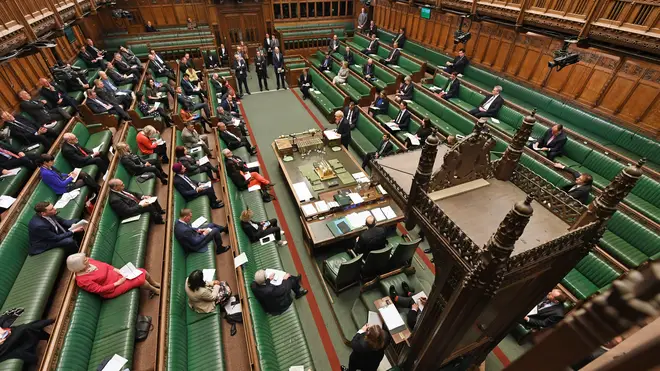
Shelagh Fogarty 1pm - 4pm
15 July 2020, 11:16

Labour leader Sir Keir Starmer will face off against Boris Johnson across the House of Commons dispatch box later as Prime Minister's Questions takes place.
The new Labour leader has settled in well to his weekly joust against Prime Minister Boris Johnson as the two trade barbs in the Commons chamber.
The pair face off with with a background of threats of new local lockdowns across the country as the coronavirus pandemic continues.
The House of Commons authorities have taken special measures due to the Covid-19 outbreak and government advice.
Today's Prime Minister's Questions is likely to last for around half an hour as MPs use the chance to grill the Prime Minister.
Held every Wednesday in the House of Commons Question Time is an opportunity for MPs and Members of the House of Lords to question government ministers about matters for which they are responsible.
These questions are asked at the start of business in both chambers and are known as 'oral questions'.
Question Time takes place for an hour, Monday to Thursday, after preliminary proceedings and private business. Each government department answers questions according to a rota called the Order of Oral Questions.
The questions asked must relate to the responsibilities of the government department concerned.
What are the questions about?
Questions asked must relate to the responsibilities of the government department concerned.
Commons oral questions are tabled by MPs at least three days in advance of the Question Time the relevant government department is due to answer.
The order in which the questions are asked is determined by the ‘shuffle’, carried out randomly by a computer.
Only MPs with questions on the order paper are allowed into the chamber and the Commons Speaker asked that those sitting on the green benches obey social distancing rules.
A number of MPs can ask questions from home, via video link.
On the day the questions are due to be asked they are printed in ‘Business Today’ in the Order Paper.MPs who are called by the Speaker to ask their question do not read it out, but simply call out its number.
When the government minister has replied, the MP can ask one further question, known as a supplementary.
Other MPs may also be called to ask supplementary questions at the discretion of the Speaker.
The Minister must reply to each in turn. Supplementary questions must be on the same subject as the original question.
The Prime Minister answers questions from MPs in the Commons every sitting Wednesday from 12pm to 12.30pm.
The session normally starts with a routine question from an MP about the Prime Minister's engagements. This is known as an 'open question' and means that the MP can then ask a supplementary question on any subject.
Following the answer, the MP then raises a particular issue, often one of current political significance. The Leader of the Opposition then follows up on this or another topic, being permitted to ask a total of six questions. The Leader of the Opposition is the only MP who is allowed to come back with further questions.
Most MPs will table the same question about engagements and if they do, only their names will appear on the question book. After the first engagements question has been asked, any other MPs who have tabled the same question are simply called to ask an untabled, supplementary question.
This means, in theory, that the Prime Minister will not know what questions will be asked of them. However, the Prime Minister will be extensively briefed by government departments in anticipation of likely subjects they could be asked about.